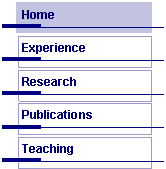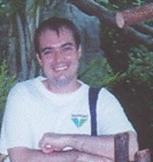



|
Home Page |
|
Biographical Sketch I am currently an assistant professor in the Department of Computer Science and Information Systems at Texas A&M University—Commerce. I received my Bachelors in computer science at Purdue University and Masters in computer science with a concentration in artificial intelligence at Johns Hopkins University. In 2004 I received my Ph.D. in computer science from the University of Memphis for research on applications of complex systems concepts to understanding intelligence and applying them to autonomous agents and robotic systems.
|
|
Derek Harter Texas A&M University—Commerce Stonewall St, Journalism 208 Commerce, TX 75428 |
|
To contact me: |

|
Derek Harter, Ph.D. |

|
Research Interests My current work involves a number of distinct research lines in artificial intelligence and cognitive science. My main research interests are in autonomous agents and complex adaptive systems. I have had the good fortune to work with a strong interdisciplinary cognitive science program for the last four years here at the University of Memphis' Institute for Intelligent Systems. I have been involved on interdisciplinary grants working on natural language processing and autonomous agents, that have included the contributions of a wide range of disciplines including cognitive psychology, mathematics, neuroscience, computer science and linguistics. More specific research interests I have focused on include the use of nonlinear dynamics in neural models for the control of autonomous agents. In 2001 I initiated a grant funded by NASA to develop models of aperiodic neurodynamics for use in robotic exploration vehicles (SODAS). Since that time I have been a co-investigator on the NASA intelligent systems research grant. I have been privileged to work with people such as Walter J. Freeman, author of How Brains Make Up Their Minds, Stan Franklin, author of Artificial Minds, and Robert Kozma, principle investigator of the grant and my dissertation adviser. In my dissertation, for example, I develop models of action selection and cognitive map formation based on the basic principles of neurodynamics proposed by Dr. Freeman. This involves computational neurodynamical models that utilize oscillatory and chaotic dynamics to aid in the formation of perceptual and conceptual meanings for the guidance of actions in autonomous agents. I have also worked closely with Dr. Arthur C. Graesser in research on the development of computerized tutoring systems utilizing virtual agents and natural language processing techniques. While at the Institute for Intelligent Systems I played a significant role on grants to design and develop a simulated teaching agent, called AutoTutor, that utilizes natural language dialogs to tutor students on various subjects. Here is a list of some of the subjects that I am interested in and that are related to my research: · Complex Adaptive Systems · Synergistics and Self-organization · Nonlinear Dynamical Systems and Chaos Theory · Dynamical Cognitive Hypothesis · Embodied Cognition · Evolutionary Theory and Evolutionary Computation · Artificial Intelligence and Artificial Life
|
|
Assistant Professor, Dept Computer Science and Information Systems |